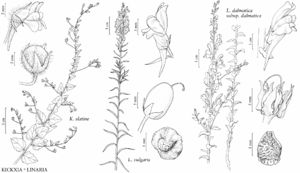Difference between revisions of "Kickxia elatine"
Fl. Belg., 35. 1827.
FNA>Volume Importer |
imported>Volume Importer |
||
| (6 intermediate revisions by 2 users not shown) | |||
| Line 16: | Line 16: | ||
}}{{Treatment/ID/Special_status | }}{{Treatment/ID/Special_status | ||
|code=F | |code=F | ||
| − | |label= | + | |label=Illustrated |
}} | }} | ||
| − | |basionyms={{Treatment/ID/ | + | |basionyms={{Treatment/ID/Basionym |
|name=Antirrhinum elatine | |name=Antirrhinum elatine | ||
|authority=Linnaeus | |authority=Linnaeus | ||
| + | |rank=species | ||
| + | |publication_title=Sp. Pl. | ||
| + | |publication_place=2: 612. 1753 | ||
}} | }} | ||
|synonyms= | |synonyms= | ||
| Line 37: | Line 40: | ||
|elevation=0–900 m. | |elevation=0–900 m. | ||
|distribution=B.C.;Ont.;Ala.;Ark.;Calif.;Conn.;Del.;Ga.;Ill.;Ind.;Kans.;Ky.;La.;Md.;Mass.;Mich.;Mo.;N.J.;N.Y.;N.C.;Ohio;Okla.;Oreg.;Pa.;R.I.;S.C.;Tenn.;Tex.;Va.;Wash.;W.Va.;Wis.;Eurasia;n Africa;introduced also in Mexico;Central America;South America;Atlantic Islands;Australia. | |distribution=B.C.;Ont.;Ala.;Ark.;Calif.;Conn.;Del.;Ga.;Ill.;Ind.;Kans.;Ky.;La.;Md.;Mass.;Mich.;Mo.;N.J.;N.Y.;N.C.;Ohio;Okla.;Oreg.;Pa.;R.I.;S.C.;Tenn.;Tex.;Va.;Wash.;W.Va.;Wis.;Eurasia;n Africa;introduced also in Mexico;Central America;South America;Atlantic Islands;Australia. | ||
| − | |discussion=<p>Kickxia elatine differs from K. spuria in leaf and calyx characters. Two subspecies of K. elatine have been described [subsp. elatine and subsp. crinita (Mabille) W. Greuter]; they are poorly defined (D. A. Sutton 1988; M. Ghebrehiwet 2001) and differentiated on the basis of indument density.</p> | + | |introduced=true |
| + | |discussion=<p><i>Kickxia elatine</i> differs from <i>K. spuria</i> in leaf and calyx characters. Two subspecies of <i>K. elatine</i> have been described [subsp. elatine and <i></i>subsp.<i> crinita</i> (Mabille) W. Greuter]; they are poorly defined (D. A. Sutton 1988; M. Ghebrehiwet 2001) and differentiated on the basis of indument density.</p> | ||
|tables= | |tables= | ||
|references= | |references= | ||
| Line 46: | Line 50: | ||
-->{{#Taxon: | -->{{#Taxon: | ||
name=Kickxia elatine | name=Kickxia elatine | ||
| − | |||
|authority=(Linnaeus) Dumortier | |authority=(Linnaeus) Dumortier | ||
|rank=species | |rank=species | ||
| Line 61: | Line 64: | ||
|publication title=Fl. Belg., | |publication title=Fl. Belg., | ||
|publication year=1827 | |publication year=1827 | ||
| − | |special status=Weedy;Introduced; | + | |special status=Weedy;Introduced;Illustrated |
| − | |source xml=https:// | + | |source xml=https://bitbucket.org/aafc-mbb/fna-data-curation/src/2e0870ddd59836b60bcf96646a41e87ea5a5943a/coarse_grained_fna_xml/V17/V17_100.xml |
|genus=Kickxia | |genus=Kickxia | ||
|species=Kickxia elatine | |species=Kickxia elatine | ||
Latest revision as of 19:24, 5 November 2020
Plants 4–120 cm. Leaves: petiole 2–6 mm; blade: proximal 15–35 × 10–30 mm, base truncate or rounded to cuneate, distal 4–25 × 2–14 mm, base hastate to sagittate, villous with scattered glandular hairs. Pedicels 10–22 mm. Flowers: sepal lobes lanceolate, 3–6 × 1–2 mm, not accrescent, apex acuminate, villous; corolla tube 1–2 mm, palate yellow, inflated, hairy, spurs 5–6 mm, abaxial lobes yellow to violet, adaxial blue to violet, 2–3 mm; abaxial filaments 1.5–2 mm, adaxial 1–1.5 mm; style included, 1.3–1.5 mm; stigma straight. Capsules ovoid-globular, 3–5 mm. Seeds 1–1.5 mm, cristate-tuberculate. 2n = 36.
Phenology: Flowering May–Oct(–Dec).
Habitat: Gravelly or sandy disturbed sites, roadsides, stream banks, gravel bars, glades.
Elevation: 0–900 m.
Distribution
Introduced; B.C., Ont., Ala., Ark., Calif., Conn., Del., Ga., Ill., Ind., Kans., Ky., La., Md., Mass., Mich., Mo., N.J., N.Y., N.C., Ohio, Okla., Oreg., Pa., R.I., S.C., Tenn., Tex., Va., Wash., W.Va., Wis., Eurasia, n Africa, introduced also in Mexico, Central America, South America, Atlantic Islands, Australia.
Discussion
Kickxia elatine differs from K. spuria in leaf and calyx characters. Two subspecies of K. elatine have been described [subsp. elatine and subsp. crinita (Mabille) W. Greuter]; they are poorly defined (D. A. Sutton 1988; M. Ghebrehiwet 2001) and differentiated on the basis of indument density.
Selected References
None.
